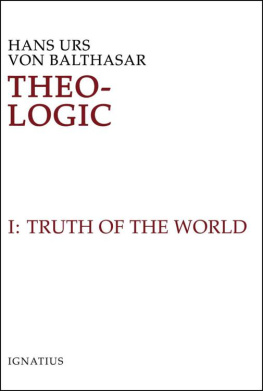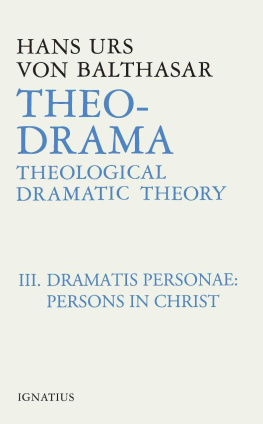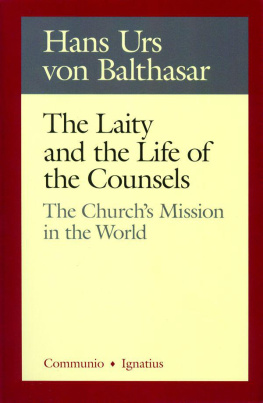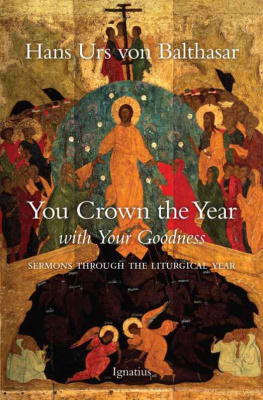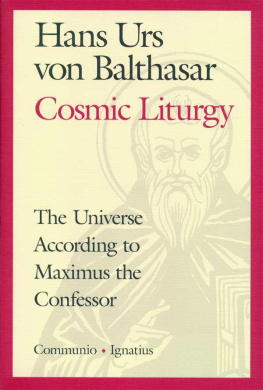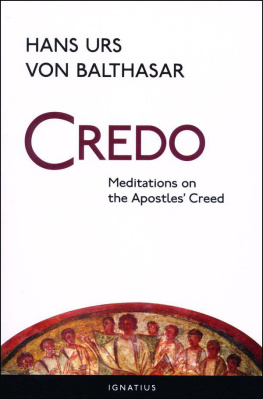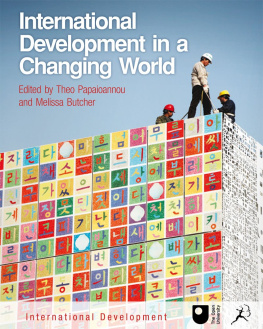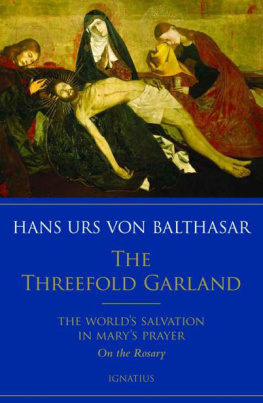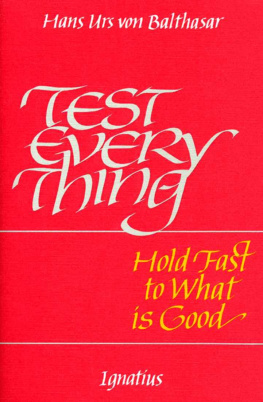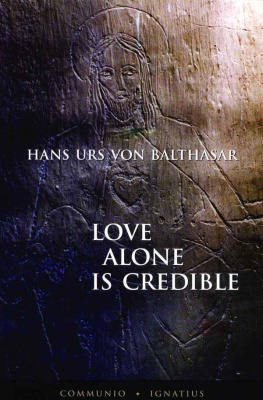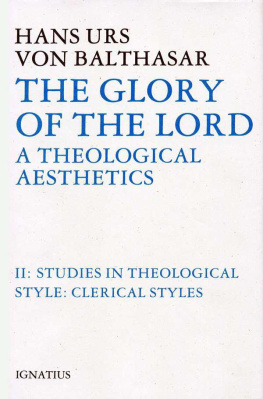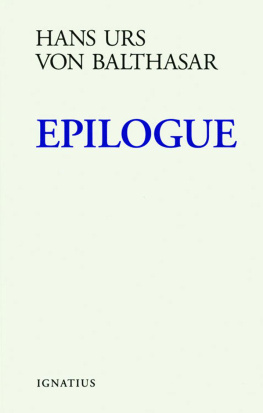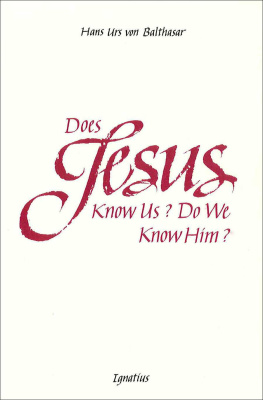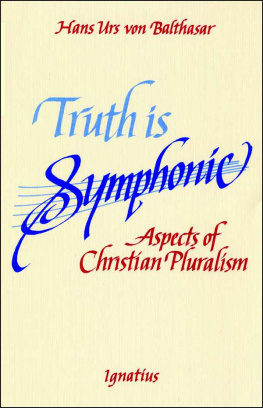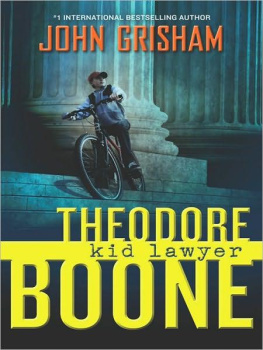THEO-LOGIC
Volume I
THEO-LOGIC
Volumes of the Complete Work:
I: Truth of the World
II: Truth of God
III: The Spirit of Truth
HANS URS VON BALTHASAR
THEO-LOGIC
THEOLOGICAL
LOGICAL THEORY
VOLUME I
TRUTH OF THE WORLD
Translated by Adrian J. Walker
IGNATIUS PRESS SAN FRANCISCO
Title of the German original:
Theologik: Erster Band: Wahrheit der Welt
1985 Johannes Verlag, Einsiedeln
With ecclesiastical approval
Cover by Roxanne Mei Lum
2000 Ignatius Press, San Francisco
All rights reserved
ISBN 978-0-89870-718-2
Library of Congress control number 00-109331
Printed in the United States of America
CONTENTS
1. The Object in the Subject
2. The Subject in the Object
3. The Double Form of Truth
1. The Degrees of Intimacy
2. The Mystery of Being
1. The Inessentiality of the Image World
2. What It Is that Signifies
3. The Word
1. The Mobility of the Idea
2. Perspective
3. Personality
4. Situation
1. Unveiling and Veiling
2. Truth, Goodness, Beauty
GENERAL INTRODUCTION
The third part of our trilogy focuses on theological logic. It asks, then, just one question: What role does truth play in the event of Gods self-revelation through the Incarnation of the Logos and the outpouring of the Holy Spirit? To be sure, a logic so understood must eventually grapple with the laws of thought and discourse governing propositions in our Aesthetics and in our Drama , inasmuch as the former concerns perception and experience, while the latter pertains to the dramatic confrontation between divine and human freedom lived out on the stage of history. Nevertheless, we cannot fruitfully pose these questions until we have first tackled the underlying problem of the logos , in other words, of the truth of being itself.
From first to last, the trilogy is keyed to the transcendental qualities of being, in particular to the analogy between their status and form in creaturely being, on the one hand, and in Divine Being, on the other. Thus, there is a correspondence between worldly beauty and divine glory in the Aesthetics and between worldly, finite freedom and divine, infinite freedom in the Drama . By the same token, our task in the present theological Logic will be to reflect upon the relationship between the structure of creaturely truth and the structure of divine truth. This reflection will set the stage for an inquiry into whether Gods truth can exhibit and express itself (in various forms) within the structures of creaturely truth. By its very nature, theological insight into Gods glory, goodness, and truth presupposes an ontological , and not merely formal or gnoseological, infrastructure of worldly being. Without philosophy, there can be no theology.
Now, the discussion of truth that we are about to undertake affords us another opportunity to reflect more explicitly upon the transcendentals that we have already treated in the previous parts of the trilogy. In doing so, we will be led by the very nature of the object itselfin this case, the fact that all the transcendentals equally determine the whole of beingnot only to underscore their inseparability (cf. Plato, Philebus 64e), reciprocal interpenetration, and mutual implication, but also, and for the same reason, to highlight the fundamental transcendental quality of unity. Just as the first volume reflects on the creaturely structure of unity (cf. pp. 153f., 167ff., 180-81, 248 herein), the second volume will enter into its divine structure (by answering the question how can absolute unity be trinitarian?). In this context, it will become clear that we can talk about unity as a transcendental only after having dealt thematically with the other transcendentals first.
Reflection on the analogous truth of being, far from getting lost in abstractions, is no less concrete than the Aesthetics or the Drama , for, like them, it forces us to face squarely the most vital questions of Christian faith and life. How, ontologically speaking, can God become man, or, to phrase the question differently: Does creaturely logos have the carrying capacity to harbor the divine Logos in itself? Presupposing that we have been able to disclose something of this fundamental mystery, we must still ask how things that do not themselves enact the incarnation of the Word can conceivably follow Christ within the world and its logic. Moving on to the indispensable framework of this sequela Christi , how can anything like a Church (understood as body and bride of Christ) make sense ontologically? The circumincession of the transcendentals suggests the necessity of, and therefore excuses, a new discussion of issues that, at least in part, we have treated in the previous panels of our triptych. After all, there is simply no way to do theology except by repeatedly circling around what is, in fact, always the same totality looked at from different angles. To parcel up theology into isolated tracts is by definition to destroy it.
In order to be a serious theologian, one must also, indeed, first, be a philosopher; one mustprecisely also in the light of revelationhave immersed oneself in the mysterious structures of creaturely being (and the simple can do this just as well as, and presumably better than, the wise and understanding [Mt 11:25]). Insofar as he is a philosopher, the authentic theologian by definition is struck by boundless amazement at the structural complexity of the transcendentals in contingent being, whose bottomless mystery defies all claims to have definitively mastered any problem. Not only does the real distinction between essence and esse -existence (where this latter pair itself eludes univocity) pervade every last fiber of all finite being, but, as we will show, each pole can be accounted for only and strictly in terms of the other. The same holds true of the polarity between the individual and the universal within unity; between form [ Gestalt ] and light within beauty (I have to laugh at the aestheticians, says Goethe, who go through painful contortions to make their poor stock of abstract words capture the ineffablewhich they are pleased to call beautyin a concept, Gesprche mit Eckermann April 18, 1827); between obedience and freedom within ethics; between finite and infinite freedom, where the former attains its realization precisely by surrendering itself to the latter. The existence of such polarities gives finite being the consistency, vitality, and dignity that elevate it beyond mere facticity and make it the object of an unquenchable interest, indeed, of a reverent, astonished wonderment. For the more deeply the knower delves into these structures, the more they unveil themselves to him and, at the same time, withdraw behind the veil of their mystery. In what follows, we will have to deal centrally and in extenso with the paradox that unveiling is perfectly compatible with veiling and mystery, in other words, that the mysteriousness of being has absolutely nothing to do with irrationality. Clearly, such a project calls for some explicit treatment of the polarity between faith and knowledge, but this is an issue thatespecially when considered in relation to the person and loveno one should find out of place in a work like this.
And since we will be talking about love, we will also have to ask whether this love might not be the hidden ground underlying the transcendentals and their circumincessive relation. If this should turn out to be the case, then the apparent duality connoted by the word philo-sophia , when looked at profoundly enough, could ultimately be resolved in a living unityand would thus, in its own distinctive way, display the analogy of worldly being to infinite being, which is said to be identically wisdom and love.
Having said this, we already touch upon the deepest problem to be faced in a theo-logic. We can express this problem in the form of a paradoxical question: the polarity uncovered in the analysis of worldly truth (and of the other transcendentals) seems to underscore precisely the creatures dissimilarity to the Creators being. Yet if the inner structure of worldly truth is characterized by the vitality alluded to above, might not this truth include at the same time an aspect of positive similarity to, or comparability with, God? This in turn implies a further question about just what it is that makes finite being an image and likeness of absolute being in the first place (we pose this question here without entering into the distinction between image and vestige). But this question becomes meaningful, indeed, urgent, only insofar as our horizon is theological and trinitarian.
Next page
